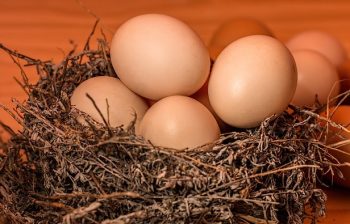Talking About Eggs in Chinese Posted by Ayana on Oct 15, 2018 in Uncategorized
Useful vocabulary for breakfast.
蛋类 (dàn lèi) is a general word for eggs of any kind. It is used when referring to eggs in general, and not from a specific kind. My Chinese friend, for example, who consistently exhorts me to eat healthier food, believes in the benefits of eggs: 你应该多吃些有营养的东西,比如蔬菜,蛋类,水果等等 (nǐ yīnggāi duō chī xiē yǒu yíngyǎng de dōngxī, bǐrú shūcài, dàn lèi, shuǐguǒ děng děng, “you should eat more nutritious things like vegetables, eggs, fruits and so on”). But not everyone eats eggs. While visiting China with my vegan friend she had to explain over and over again: 我不吃肉,不喝牛奶, 也不吃蛋类 (wǒ bù chī ròu, bù hē niúnǎi, yě bù chī dàn lèi, “I don’t eat meat, don’t drink milk, and don’t eat eggs”).
When referring to a specific kind of egg, the bird name precedes the word for egg, 蛋 (dàn). 常见的蛋类有鸡、鸭、鹅和鹌鹑蛋 (chángjiàn de dàn lèi yǒu jī, yā, é hé ānchún dàn, “the common eggs are of chickens, ducks, geese and quails”). The most commonly eaten egg is the chicken egg, 食用最普遍的蛋类是鸡蛋 (shíyòng zuì pǔbiàn de dàn lèi shì jīdàn). In China I also ate quail eggs 鹌鹑蛋 (ānchún dàn) for the first time. A raw 鹌鹑蛋 is served with the famous Yunnan dish “crossing the bridge rice noodles”. The small raw egg is added to the hot soup with all the fresh ingredients: first the egg and the meat, then the vegetables, and finally the noodles. In the Muslim quarter of Xi’an city, Shaanxi Province, I ate fried 鹌鹑蛋 served on a skewer.
There are many ways to eat eggs, 蛋类吃法却五花八门 (dàn lèi chī fǎ què wǔhuābāmén). Boiled egg 水煮蛋 (shuǐ zhǔ dàn), for instance. You put the egg in water, 把鸡蛋放入水中 (bǎ jīdàn fàng rù shuǐzhōng), and boil 煮 (zhǔ) it for several minutes. How long? 煮几分钟? (zhǔ jǐ fēnzhōng) is the ultimate question for cooking a creamy and mellow yolk 蛋黄 (dàn huáng). The yolk is high in cholesterol, but apparently it is the most nutritious part of an egg, 蛋黄是鸡蛋中最有营养的部分 (dànhuáng shì jīdàn zhōng zuì yǒu yíngyǎng de bùfen). The egg white蛋白 (dàn bái) is less nutritious but rich in protein.
The egg shell蛋壳 (dàn ké) is, of course, not for eating. How long does it take to peel an egg 剥鸡蛋 (bāo jīdàn)? Apparently no more than 10 seconds, 十秒就能剥出完整鸡蛋 (shí miǎo jiù néng bō chū wánzhěng jīdàn). The next video shows the quickest way to peel off an egg:
Other ways of cooking eggs include, 其他烹饪蛋类的方法包括 (qítā pēngrèn dàn lèi de fāngfǎ bāokuò): scrambled eggs炒鸡蛋 (chǎo jīdàn), fried eggs煎鸡蛋 (jiān jīdàn), sunny side up太阳蛋 (tàiyáng dàn), omelet 蛋饼 (dàn bǐng), poached egg 水煮嫩蛋 (shuǐ zhǔ nèn dàn), tea eggs茶叶蛋 (chá yè dàn), and so on.
Text vocabulary
蛋类 dàn lèi = eggs
营养yíng yǎng = nutrition
普遍pǔ biàn = common
鸡蛋jī dàn = chicken eggs
鹌鹑蛋 ān chún dàn = quail eggs
五花八门 wǔ huā bā mén= omnifarious
煮 zhǔ = to boil
水煮蛋 shuǐ zhǔ dàn = boiled egg
蛋黄 dàn huáng = yolk
蛋白 dàn bái = egg white
蛋壳 dàn ké = egg shell
剥 bāo = to peel
烹饪pēng rèn = to cook
好好学习,天天向上!

Build vocabulary, practice pronunciation, and more with Transparent Language Online. Available anytime, anywhere, on any device.





Leave a comment: